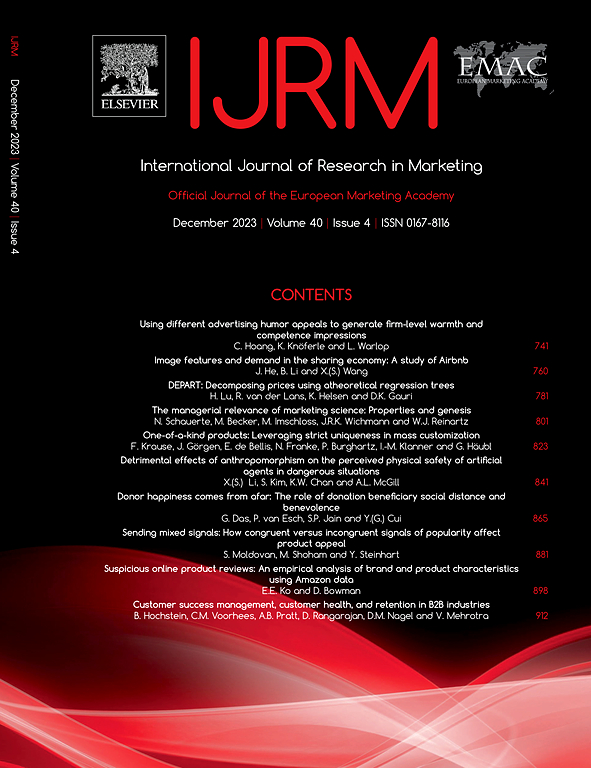Environmental sustainability considerations (or lack thereof) in consumer decision making
IF 7.5
2区 管理学
Q1 BUSINESS
International Journal of Research in Marketing
Pub Date : 2024-08-08
DOI:10.1016/j.ijresmar.2024.08.003
引用次数: 0
Abstract
Environmental sustainability is often depicted as an important attribute of consideration among consumers. Even if multiple barriers may prevent them from “walking the talk,” a common implicit assumption is that consumers think about sustainability but choose a less eco-friendly route once confronted with such obstacles (e.g., higher prices). Absent from the literature, however, is a systematic investigation of the extent to which sustainability thoughts even come to consumers’ minds. Across six studies using a diverse set of measurements (free and aided elicitation), time of purchase (past or contemporaneous), consumer contexts (online or brick-and-mortar settings), levels of consequentialism (hypothetical or incentive-compatible), and samples (Brazil, UK, and US; =7,942), our research consistently demonstrates that most consumers neglect the products’ environmental impact when making purchase decisions of fast-moving consumer goods. Environmental sustainability considerations are low in absolute terms, relative to other attributes, and even compared to participants’ own injunctive norms. Cognitive accessibility and contextual salience help explain the phenomenon. Considerations increase among consumers with strong environmental goals (e.g., high on biospheric values), for products highly prototypical of the sustainability cause (e.g., plastic bags), and when consumers are prompted with sustainability cues prior to choice (e.g., eco-labels). Methodological, managerial, and policy implications are discussed, and a simple framework to promote environmental sustainability consideration is proposed.消费者决策中对环境可持续性的考虑(或缺乏考虑
环境可持续性通常被视为消费者考虑的一个重要因素。即使多种障碍可能阻碍他们 "说到做到",但一个常见的隐含假设是,消费者会考虑可持续发展,但一旦遇到这些障碍(如价格上涨),他们就会选择不那么环保的路线。然而,对于消费者在多大程度上想到了可持续发展,相关文献却缺乏系统的调查。在六项研究中,我们使用了不同的测量方法(自由和辅助诱导)、购买时间(过去或当时)、消费环境(在线或实体店环境)、结果主义水平(假设或激励兼容)和样本(巴西、英国和美国;=7942),我们的研究一致表明,大多数消费者在做出快速消费品购买决策时会忽略产品对环境的影响。与其他属性相比,甚至与参与者自身的强制规范相比,环境可持续性考虑的绝对值都很低。认知可及性和情境显著性有助于解释这一现象。具有强烈环保目标(如生物圈价值观高)的消费者、可持续发展事业原型性强的产品(如塑料袋)、以及在选择前有可持续发展线索提示的消费者(如生态标签),都会增加对产品的考虑。本文讨论了方法、管理和政策方面的影响,并提出了一个促进环境可持续性考虑的简单框架。
本文章由计算机程序翻译,如有差异,请以英文原文为准。
求助全文
约1分钟内获得全文
求助全文
来源期刊
CiteScore
11.80
自引率
4.30%
发文量
77
审稿时长
66 days
期刊介绍:
The International Journal of Research in Marketing is an international, double-blind peer-reviewed journal for marketing academics and practitioners. Building on a great tradition of global marketing scholarship, IJRM aims to contribute substantially to the field of marketing research by providing a high-quality medium for the dissemination of new marketing knowledge and methods. Among IJRM targeted audience are marketing scholars, practitioners (e.g., marketing research and consulting professionals) and other interested groups and individuals.

 求助内容:
求助内容: 应助结果提醒方式:
应助结果提醒方式:


